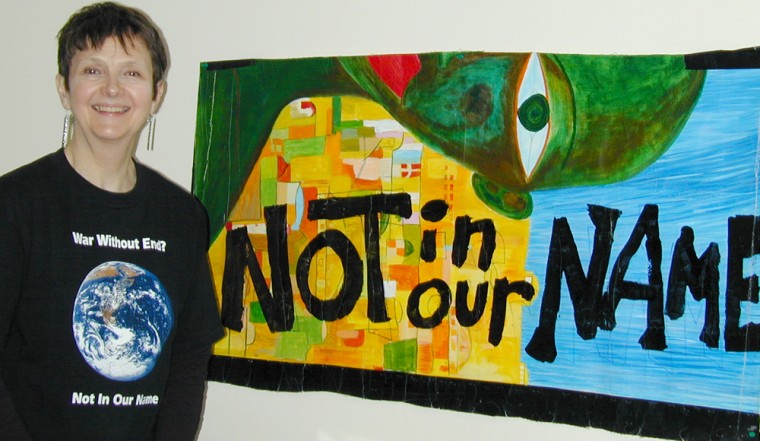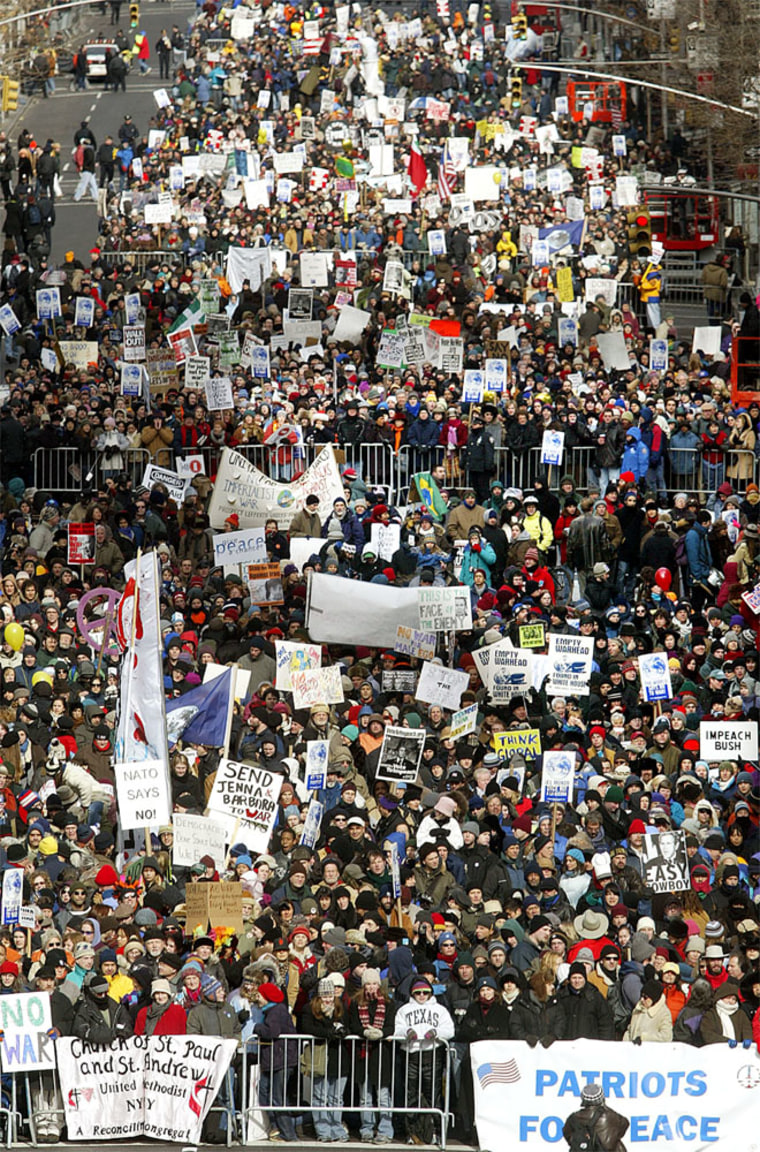They failed to stop the war, but they are still fighting.
“We felt we had a role in shaping world public opinion not to bomb Iraq. We were a part of something that felt we could stop [the war]. But, it wasn’t enough,” said Monique Dols, a coordinator for the Campus Antiwar Network — a nationwide group of student volunteers.
Despite months of antiwar demonstrations in the United States and overseas, the U.S.-led invasion took place — and the occupation continues. Yet many antiwar organizations are still going strong even as the agenda has shifted.
Organizers say they were validated by the failure to find weapons of mass destruction and the revelations about the dubious evidence used to justify the invasion of Iraq.
“Everything that gave rise to the debate last year has been proven true. On every single point the Bush administration has been proven to engage in fraud, lies, and wishful thinking,” said Sara Flounders of the International ANSWER (Act Now to Stop War and End Racism) organization.
In fact, rallies in cities and towns across the country are planned for this Saturday to mark the one-year anniversary and protest the occupation.
Largest peace march in decades
On Feb. 15, 2003, hundreds of thousands of protesters from London to Rome and New York took to the streets to protest the impending war.
With estimates of hundreds of thousands of people demonstrating in New York City alone, it was the largest antiwar demonstration in a generation.
Despite the failure to stop the invasion, the antiwar movement hailed the global reach of the protests and what they viewed as a real presence in the debate.
Christopher Preble, director of foreign policy studies at the CATO Institute, noted the movement had an effect because many of the issues raised before the war have been borne out to be true.
“If there was no debate before the war, then it’s hard to see why people would revisit the issues today. The seeds of doubt were planted by [the antiwar movement] in the first place," he said, noting the Cato Institute, an independent political think tank, also had opposed the Iraq war.
For the activists, the war itself was a blow
Emily Goldstein, a 21-year-old junior at Vassar College and another coordinator for the Campus Antiwar Network, described a feeling of anger and frustration. Many asked, “What do we do now?” she said.
Since then the Campus Antiwar Network, along with many other peace organizations, have shifted to opposing the U.S. occupation of Iraq.
“We think that the troops need to be brought home and both the military and the corporate occupation — both parts of this occupation — need to end,” said Leslie Cagan, national coordinator for United for Peace & Justice.
For veterans of other social movements — from the civil rights campaign to the Vietnam War protests — the change of agenda from anti-invasion to anti-occupation is a blip in the bigger picture.
“Like any movement of people, there are moments when we are stronger and moments when we are not as strong. But, this movement has far from dried up or gone to sleep. The level of activism around the country is fairly phenomenal,” Cagan said.
“We were able to awaken tremendous parts of the population, not only in this country, but around the world," she said. "We were part of awakening this global movement and in this country the activism does continue, even if it’s not as sexy, it's there, it's out there.”
Over the last few weeks and months, the “unsexy” work of organizing the new demonstration has been under way.
This week, the offices of the International ANSWER, United for Peace & Justice and Not In Our Name — the main sponsors for the “Global Day of Action Against War and Occupation” in New York on Saturday — were abuzz with volunteers preparing for the demonstrations.
Colorful fliers, stickers, pins, banners and T-shirts were scattered throughout the movement’s bare-bones offices. “End Colonial Occupation from Iraq to Palestine & Everywhere! Bring the Troops Home Now!” screamed from fluorescent yellow stickers being circulated by the International ANSWER Coalition.
Flounders, the co-director of the International Action Center and an organizer with ANSWER, said the level of participation is “enormous.”

Flounders, a soft-spoken 56-year-old who has been an activist since the ’60s, is encouraged by the influx of younger activists, evidence that “people are profoundly optimistic that they can influence U.S. policy.”
For its part, the Campus Antiwar Network represents that new generation. “A lot of us were never activists and never organizers before last year,” said Goldstein. Now she and other students volunteers are hoping to keep the antiwar message and spread it to other initiatives.
Broad agenda?
These include an agenda that is very clearly against most policies of the Bush administration.
We are “pretty much anti-Bush, pretty much anti-everything he and his administration stands for," said Cagan from United for Peace & Justice.
"But it is not only the Bush administration, there are plenty of Democrats that we have a problem with.”
Activists assert the administration's agenda needs to be attacked on several levels — and they oppose U.S. policy on the Mideast (seen as pro-Israel) as well as in Haiti. “I guess I would say that what the government is doing is broad," said Mary Lou Greenberg, a volunteer with Not in Our Name. "People need to know that there is a connection and a link."
The partisanship can undermine the cause. "A number of the antiwar crowd were supporters of U.S. intervention elsewhere in the 1990s, for example, in the Balkans under the Clinton administration," noted Preble of the Cato Institute. "So their opposition to the war in Iraq reveals that much of their criticism could be partisan. If Democrats go to war, they are supportive, but if Republicans go to war, they are against it. Things tend to become criticized in a partisan way."
MoveOn.org, a Web site that was integral in fueling the initial antiwar movement, is now calling for Congress to formally reprimand President Bush for his actions leading to the war in Iraq.
MoveOn.org is unique in that it is not strictly a peace organization but aims to get more people involved in the political process and is not calling for the complete withdrawal of U.S. troops from Iraq, according to Peter Schurman, the executive director of the organization.
International ANSWER, United for Peace and Justice and Not in Our Name all plan to protest at both the Republican and Democratic conventions this summer.
The organizations take issue with the Bush administration for leading the country into Iraq, but they recognize that Sen. John Kerry, the presumed Democratic presidential nominee, also voted in favor of the invasion of Iraq. So, they are hesitant to throw their weight behind one particular candidate in favor of another.
Grass-roots movement
The power of grass-roots movements is the key to the future for most of the peace organizations, and the Internet has proven an important tool.
“The large, powerful media has the ability to shape issues. But the Internet has enabled people with different views to express them. It has the ability to be as revolutionary as the printing press,” Flounders said.
The Internet has allowed many of the antiwar organizations to create a global forum to promote their alternative agenda.
With the help of time and maturity. “the movement has grown stronger, more sophisticated, and has a deeper understanding of what it’s up against…. There is a deeper commitment now,” Flounders said.
That depth of commitment beyond the fad of a peace rally is exactly what the older generation of activists is counting on to carry the movement forward.
“It’s a lot less simple than it was last year," said Goldstein of the Campus Antiwar Network. "There are a lot of issues out there. It’s hard to integrate it all into one movement. But it is now a movement that thinks of itself as a long-term thing.”
